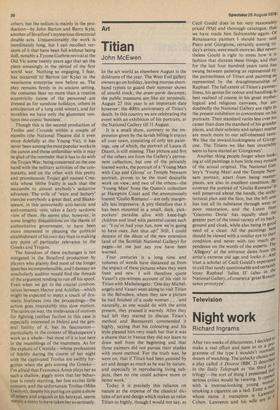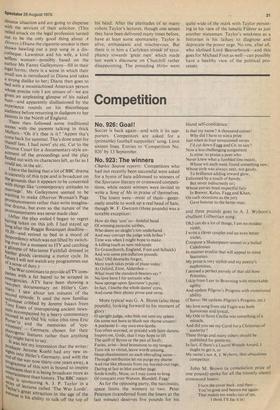Television
Night work
Richard Ingrams
After two weeks of dilatoriness, I decided t° make a real effort and tune in to a Pr°,., gramme of the type I wouldn't nornah/ dream of watching. The unlucky choice.01,5 a play called A Divorce (BBC 2) descr!
i heua
n the Daily Telegraph as the third In t trilogy'—the sort of thing I presumed iliac] serious critics would be viewing. It oPenen with a morose-looking young W°1118,0 smoking a cigarette on a bed. Enter a 111.-ce whose name it transpires is 1-V/re.% Cohen. Lawrence and his wife are In divorce situation and are going to dispense With the services of their solicitor. (This veiled attack on the legal profession turned out to be the only good thing about A Divorce.) Diana the cigarette-smoker is then Shown bawling out a pop song in a discotheque. Lawrence and his wife, a kind selfless woman—possibly based on the author Ms Fanny Galleymore—fill in their legal forms; there is a scene in which their small son is introduced to Diana and takes a strong dislike to her; Diana then goes to bed with a moustachioed American person Whose precise role I am unsure of—we are given an unpleasing glimpse of his naked bum—and apparently disillusioned by the experience rounds on his discotheque audience before returning in dudgeon to her Parents in the North of England. There then followed some traditional scenes with the parents talking in thick Mellors—'0h it's thee is it ? 'Appen tha's come back for summat. Tha's done areet for thaself lass. I had nowt' etc etc. Cut to the Divorce Court for a documentary-style enactment of the proceedings and the play fizzled out with its characters left, as far as I could see, in the air. I have the feeling that a lot of BBC drama IS currently of this type and is broadcast on the grounds that it appears to be concerned with things like 'contemporary attitudes to marriage'. Ms Galleymore seemed to be wanting to make Observer Woman's Page Pronouncements rather than write imaginative drama, but even so the nature of the Pronouncements was never made clear. (After the play ended I began to regret having taken on this job. I had stayed up Tlig after the Reggie Bosanquet deadline.P.30—and retired to bed in a mood of ,'esPondency which was not lifted by switching over for a moment to ITV and catching a gl pse of Marianne Faithfull dressed in leather goods caressing a motor cycle. In future I will not watch any programmes out
of a sense of duty.)
„ The War continues to provide all TV com„wanies with a fat barrel to be scraped in cMergencies. ATV have been showing a t rsyn-Part documentary on Hitler's Gern,any. I saw about ten minutes of the crind episode. It used the now familiar nique cribbed by Jeremy Isaacs from r'enenY Essex of interspersing ancient newsntels accompanied by a heavy commentary ned in an Old Vic voice (this time Eric writrters) and the memories of 'eyes' — Germans chosen for their they features rather than anything `Iy. might have to say. Dro`dwas riot my impression that the writer/ sightsueer Jerome Kuehl had any new in 1-1(1 into Hitler's Germany, and with the 11 of the war now thirty-one years away, a sus.:6.rearnme of this sort is bound to inspire trite itsthat it is being broadcast more as .1nment than history. The BBC meanvries
is sponsoring A. J. P. Taylor in a 4
ut lectures called 'The War Lords'. I4Ylor's
great attraction in the age of the
ut lectures called 'The War Lords'. I4Ylor's
great attraction in the age of the i 'Lle s his ability to talk off the top of
his head. After the platitudes of so many robots Taylor's lectures, though one senses they have been delivered many times before, have at least some spontaneity. Taylor is alive, enthusiastic and mischievous. But there is in him a Carlylean streak of sycophancy towards 'great men' which made last week's discourse on Churchill rather disappointing. The preceding Hitler went
quite wide of the mark with Taylor persisting in his view of the lunatic Fiihrer as just another statesman. Taylor's weakness as a historian is his failure to diagnose and deprecate the power urge. No one, after all, who idolised Lord Beaverbrook—and this goes for Michael Foot as well—can possibly have a healthy view of the political processes.



























 Previous page
Previous page